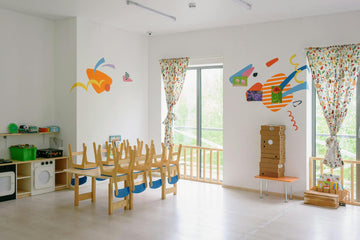
Your family's health starts at home.
Creating a happy, healthy home goes far beyond aesthetics and matching decor. It's about cultivating an environment that supports your physical well-being, nurtures your mental health and fosters a sense of peace and safety.
As a family, we've experienced firsthand the impact of your home's health on your health as a whole being, and can't stress enough how crucial it is to take proactive steps in safeguarding your home environment.
Set your family up for success by implementing these five foundational practices for better home health.
Prevent Water Damage and Mold Growth
Water damage and mold growth are silent threats to your health, often going unnoticed until they’ve caused significant harm. Mold, in particular, can lead to respiratory issues, allergies, and even chronic health conditions like environmentally acquired illnesses (EAI). To protect your home and health, consider these preventative measures:
-
Swap Drying Mats from Linen to Diatomaceous Earth: Traditional linen towels and bath mats can retain moisture, creating a breeding ground for mold and bacteria. Diatomaceous earth mats, on the other hand, are made from a highly absorbent stone that helps keep your bathroom and kitchen dry and mold-free.
-
Use a Moisture Meter: Early detection is key to preventing water damage. Keep a moisture meter handy to check for any signs of leaks or moisture in walls, floors, or ceilings. This tool can detect moisture in various surfaces, including wood and masonry, allowing you to address issues before they escalate.
-
Monitor Humidity Levels: Excess humidity can lead to mold growth, especially in the winter months. Place humidity meters on different levels of your home to ensure the air remains dry and comfortable. If necessary, invest in a dehumidifier to keep moisture at bay.
-
Install Water Detector Alarms: Small, undetected leaks can cause significant damage over time. Place water detector alarms behind appliances like dishwashers, refrigerators, and washing machines. These alarms will alert you to any leaks, allowing you to act quickly and prevent costly repairs.
Implement a No-Shoes Policy
Have you ever thought about what you’re bringing into your home when you wear your shoes inside? Dirt, mud, bacteria, and other contaminants hitch a ride on your shoes and get tracked throughout your living space. By the time you take your shoes off, you’ve spread these unwanted guests all over your floors—surfaces where you and your loved ones spend a lot of time.
-
Establish a Designated Shoe Area: As soon as you enter your home, take off your shoes and place them in a designated area near the door. This simple habit not only keeps your home cleaner but also reduces your exposure to outdoor pollutants.
-
Protect Your Family’s Health: If you have children, this practice becomes even more important. Little ones spend a lot of time playing on the floor, and their developing immune systems are more vulnerable to germs and toxins. By keeping shoes off indoors, you create a safer, healthier environment for them to explore in.
Prioritize Indoor Air Quality
We often overlook the importance of the air we breathe indoors, yet it’s a critical aspect of our health, especially for those with allergies or respiratory issues. Clean air can reduce your risk of illness and improve overall well-being. Here’s how to ensure your home’s air quality is top-notch:
-
Test Your Home’s Air Quality: Start by getting your home environment tested for pollutants like mold, dust mites, and volatile organic compounds (VOCs). Understanding your home’s air quality allows you to take targeted action to improve it.
-
Invest in a HEPA Air Filter: High-Efficiency Particulate Air (HEPA) filters are designed to remove 99.97% of airborne particles, including allergens, mold spores, and pet dander. We opted for a few Air Doctor filters for different areas of our home and they have worked so well over the last few years!
-
Eliminate Indoor Toxins: Conventional candles, air fresheners, and plug-ins may smell nice, but they often release harmful chemicals into the air. Ditch these products in favor of non-toxic alternatives or simply enjoy the natural scent of a clean home.
-
Ventilate Daily: Fresh air is a natural purifier. Aim to open your windows for 20-30 minutes each day, even in winter, to let fresh air circulate. The only exception is if outdoor air quality is compromised by pollutants like smoke or smog.
Ensure You're Drinking Clean, Safe Water
Water is essential for life, and the quality of the water you consume at home plays a significant role in your overall health. If you rely on city water, it’s important to know what’s in it and take steps to purify it.
-
Test Your Water: Start with an at-home water test kit like Tap Score to identify any contaminants in your tap water. Knowing what’s in your water allows you to choose the most effective filtration system for your needs.
-
Choose the Right Filtration System: Depending on your test results, you might opt for a countertop filter like Berkey, or go for an under-sink reverse osmosis (RO) system. If you choose RO, be sure to remineralize your water with mineral drops to maintain its nutritional value.
-
Filter Water Beyond the Kitchen: Clean water isn’t just for drinking. Consider investing in filters for your shower heads, bath spouts, and even a whole-home filtration system to ensure that every drop of water in your home is pure and safe.
Reduce Toxic Exposures
Our homes are filled with products that can contribute to a higher toxic load on our bodies. From cleaning supplies to personal care products, reducing these exposures is essential for creating a truly healthy home. While non-toxic options can be more expensive, even small changes can make a big difference.
-
Swap Dryer Sheets for Wool Dryer Balls: Conventional dryer sheets are loaded with chemicals that can cling to your clothes and irritate your skin. Wool dryer balls, paired with a few drops of essential oils, are a natural and effective alternative.
-
Switch to Non-Toxic Detergents: Your skin is your largest organ, and it absorbs whatever is on your clothes. Opt for non-toxic laundry detergents that are free from harsh chemicals, dyes, and artificial fragrances.
-
Ditch Plastic Food Containers: Heating food in plastic containers can cause harmful chemicals to leach into your food. Replace plastic with glass storage containers, which are safer and more durable. Thrift stores and sales events like Black Friday are great opportunities to stock up without breaking the bank.
-
Say Goodbye to Artificial Fragrances: Instead of using candles, air fresheners, or wall plug-ins, try diffusing essential oils or simply letting your home’s natural scent shine through. You might be surprised at how quickly you adjust to a fragrance-free home—and how much better you feel as a result.
Creating a happy, healthy home is a journey of small, intentional steps that add up to significant benefits over time. By focusing on these five foundations—preventing water damage, keeping shoes off inside, improving air quality, ensuring clean water, and reducing toxic exposures—you’re not only protecting your physical health but also cultivating a space that nurtures your mind and soul. Your home should be a sanctuary, a place where you and your loved ones can thrive. Start with these tips, and watch how they transform your living space into a true haven of wellness.
May contain affiliate links.




